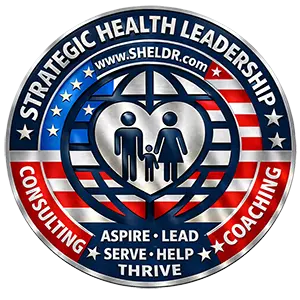Are your health system’s leaders fluent in AI—or just reacting to it?
Discover why mastering AI is now essential for visionary health leaders driving change, innovation, and better outcomes across their organizations.
Executive Summary: Strategic fluency is now mission-critical for health leaders. This chapter shows how leaders who understand the mechanics, ethics, and governance of technology transform care, streamline costs, and safeguard equity. By questioning outputs, fostering innovation, and driving change, these leaders harness technology as a strategic force — not a risky gamble. Lacking fluency, leaders risk ethical failures, wasted investment, and shattered trust. Tomorrow’s winners are building this skill now to guide their systems confidently. To learn more, use the links, questions, learning activities, and references.
Table of Contents
Introduction
In healthcare’s not-so-distant past, leaders were praised for their financial savvy, clinical understanding, and people management skills. Technical know-how was often relegated to IT departments. But today, artificial intelligence is rapidly emerging as a transformative force across clinical and administrative domains.
Technology as a Strategic Driver, Not Just a Tech Tool
By asking these probing questions, leaders hold their AI implementations to high standards and avoid blind trust in “the computer’s answer.” This competency is also critical during vendor selection – AI-ready leaders delve into how a product was developed, demanding evidence of clinical validity and fairness.
Ethical and Equitable Leadership
In practice, this could involve establishing an AI Ethics Board within the organization to review all major AI implementations and ensure compliance with ethical standards. A strategic leader might also influence broader policy by participating in industry groups that shape AI guidelines or lobbying for smart regulations that protect patients without stifling innovation.
Health leaders must become fluent in AI—not as technologists but as stewards of strategy, ethics, and transformation. AI fluency is no longer optional. It enables leaders to translate algorithmic power into real outcomes—better care, more intelligent decisions, and system-level innovation. Without this skill, leaders risk misalignment, ethical failures, and missed opportunities. Strategic fluency means knowing when to trust a model, when to question it, and how to lead human teams alongside it. Leaders must move beyond buzzwords and lead with confidence, clarity, and competence in the era of AI.
- Audit Your AI Readiness: Assess current leadership knowledge and pinpoint key gaps in AI fluency.
- Launch AI Governance Training: Ensure leaders understand bias, validation, and use-case fit before approving any AI deployment.
Lead Decisively in the AI Era: Are You Truly Ready?
Strategic fluency has become the defining edge for health leaders determined to thrive—not just survive—in this decade. This chapter strips away the hype and shows why understanding technology isn’t about coding algorithms but about leading smarter, asking sharper questions, and steering your organization’s ethical compass. Technology is rapidly rewriting how we forecast risk, allocate resources, and even measure trust. Without a command of its strengths and blind spots, leaders gamble with patient outcomes, organizational reputation, and community faith.
Those who build fluency now will translate complex data into actionable strategies, embed equity safeguards before harm occurs, and champion a culture where technology serves—not dictates—care. Those who hesitate will watch competitors set new benchmarks for value, safety, and innovation while they scramble to keep up.
So ask yourself: Will you be the leader who questions AI deeply, governs it wisely, and channels it toward your mission—or will you let the algorithm steer without your hand on the wheel?
Consider the discussion questions and learning activities, then checkout these articles at the Strategic Health Leadership (SHELDR) website:
Deep Dive Discussion Questions
- In what ways should we be auditing AI tools today to protect vulnerable populations tomorrow?
- How might reverse mentorship accelerate your executive team’s comfort and curiosity with AI?
Professional Development & Learning Activities
- Reverse AI Mentorship Circles: Pair senior executives with early-career tech-savvy staff for monthly sessions exploring AI dashboards, ethics scenarios, and patient impact stories.
- AI Ethics War Room: Run a rapid-fire workshop where leaders debate tricky AI cases, from privacy dilemmas to biased risk scores, then draft actionable policy responses.
- Leadership Journal: AI Reflections: Have each leader keep a weekly AI leadership journal answering: What did I learn? What did I question? What will I change?
Videos
- AI Stethoscopes, Mayo Clinic Platform, HIMSS 2024. YouTube. https://www.youtube.com/watch?v=abcdef
- “Revolutionizing Healthcare in the Age of AI.” Lloyd Minor, MD. Stanford Medicine.
- How Is Artificial Intelligence Revolutionizing Health Care, Deloitte Digital




